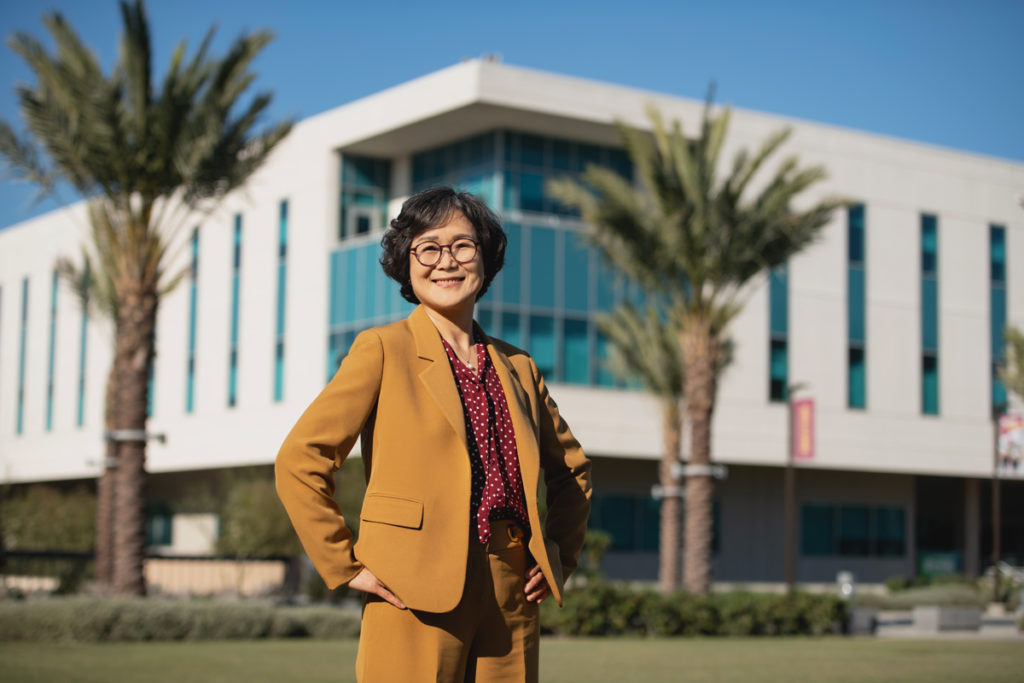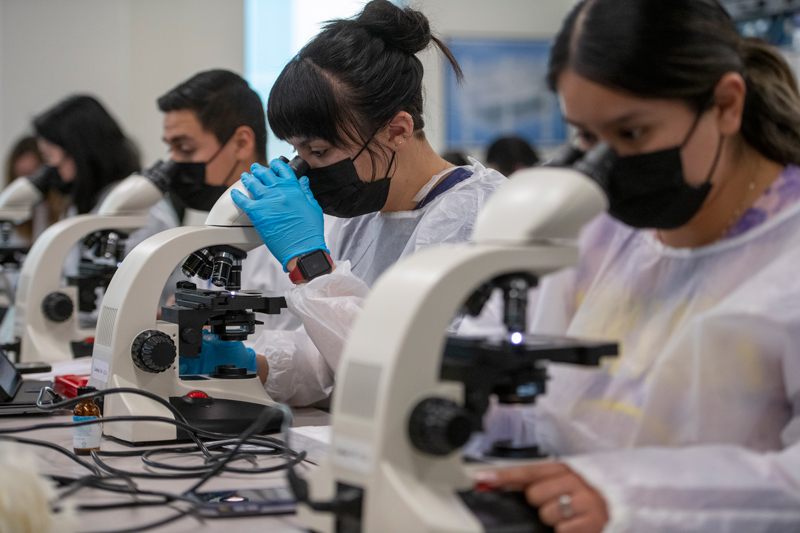A Healthy
Outlook
Dean Mi-Sook Kim of the College of Health, Human Services and Nursing sees greatness ahead
Born and raised in South Korea, Mi-Sook Kim began working in higher education in 1990 as a research assistant at Chung-Ang University in her native country. Her career has led her all the way to CSUDH, where she took over as Dean of the College of Health, Human Services and Nursing in June 2021.
She went on to earn a BS in physical education and an MS in kinesiology from Chung-Ang, then moved to the U.S. to complete her PhD in kinesiology at Purdue University, specializing in sport and exercise psychology.
Before joining CSUDH, Kim worked as a professor of kinesiology at San Francisco State University (SFSU) for over 20 years. During her tenure at SFSU, Kim also served as chair of the Department of Kinesiology and led the Division of Graduate Studies as interim dean for two years. Her scholarship examines sports and exercise psychology from positive motivational climates and cross-cultural perspectives. Kim has served on the board of directors of the American Kinesiology Association and in January 2017 was awarded the organization’s Distinguished Leadership Award.
What is the mission of CHHSN under your leadership?
Under my leadership, the mission of CHHSN continues to be preparing knowledgeable, competent, and effective professionals who are committed to improving our community’s life-long health, development, and overall adaptability. We emphasize excellence in our teaching and in our scholarship.
In a way, all health-related colleges have a similar mission. But our college at CSUDH particularly emphasizes working in a diverse and evolving society. That’s the beauty of what we do. This approach was developed when the college started, and we have kept that as part of our mission ever since.
Was that diversity aspect of CSUDH’s mission something that attracted you to the position?
When I decided to pursue leadership positions, two key words attracted me to this campus and its mission. CSUDH is devoted to access and transformation through education. Those words mean a lot to me, because that’s what I went through in my own journey. Education helped me open my eyes to my potential and aspirations, and really transformed me from a little girl in a male-dominated society, helping me start to think beyond what I thought I could do and turning me into who I am.
I really believe in higher education transforming people. Access is key and CSUDH is ahead of other schools in that area. I love it. We are ranked second in the nation for economic mobility, which proves our success in these areas, and I am proof of that myself.
How would you characterize your first year as dean?
Curious, excited, affirmed, determined, and now motivated and supported.
I arrived during a transitional year after the COVID-19 pandemic. So I felt like I was walking into an empty house in the beginning. However, it did not take that long to feel and learn many viable and achievable aspirations, dreams, hopes, and goals that were underway among faculty, staff, and students. The potential of the college was unlimited and yet to be discovered and recognized. While being excited about the positive energy and vibes in the college, I also quickly learned the college needed solid infrastructure in terms of the data, budgets, curricula, and public images to move this aspirational college forward.
After my listening tours, I pulled all the to-dos, opportunities, and ongoing initiatives into the college’s strategic architecture. I drew out our strategic maps using inductive methods so we can collectively know where we are going and understand why we do what we do in our daily operations. The college’s theme in the strategic plan is Habits of a Thriving CHHSN. We will strengthen our good habits, unlearn bad ones, and learn new, better habits that allow us to accomplish our goals.

When I decided to pursue leadership positions, two key words attracted me to this campus and its mission. CSUDH is devoted to access and transformation through education. Those words mean a lot to me, because that’s what I went through in my own journey. Education helped me open my eyes to my potential and aspirations, and really transformed me from a little girl in a male-dominated society, helping me start to think beyond what I thought I could do and turning me into who I am.”
Which of your majors has the largest enrollment?
The Department of Child Development. They have a great curriculum, dedicated faculty, and there is also a growing workforce demand in early childhood and preschool settings. Also, the state has established a new P3 teaching credential, which is for educators working with grades K through 3.
This new credential is one thing that’s making this program grow quickly. Also, Gov. Newsom’s plan to expand early childhood education through universal pre-K is creating a need for educators with expertise in these fields.
After child development, the next biggest majors are kinesiology and health science, because of their broader applications in health-related workforces.
Although their enrollments are much smaller, we have several sizable professional graduate programs that are well-known locally, nationally, and internationally because of their unique curricular designs and professionally-focused training approaches. Those include occupational therapy, orthotics and prosthetics, and our fully online nursing degree. Also, our MS in radiologic imaging sciences is an executive-style program that provides professional advancement and management-related training.
In addition, our marriage and family therapy program is undergoing its first accreditation. Our social work program is also very strong, because we have a unique focus on critical race theory. We thread those ideas through the curriculum, which is really a one-of-a-kind approach.
Over the past few years, CHHSN has added several advanced and professional degrees to its offerings. Why is this so important to the university?
I would say it’s not that they are so important to us, but important for the students in those fields, so they are better prepared to address the challenges of today’s complex and ever-changing health care and education settings.
For example, disciplines like occupational therapy are advancing quickly, with a lot more skills and knowledge required to get started. At the same time, universities need to produce leaders who can do research reflecting both societal needs and an advanced understanding of their patients’ conditions. The advanced and professional degrees will prepare our students for clinical work with patients, while at the same time training them to answer clinical questions through their research activity.
We will be offering the Occupational Therapy Doctorate (OTD), which will be the first and only publicly-funded clinical occupational therapy doctorate in Southern California, and the first doctoral program offered at CSUDH. Also, we are developing a Master of Public Health (MPH) and a Doctor of Nursing Practice (DNP) to be offered in a few years. These advanced degrees will not only produce well-equipped practitioners and leaders to local communities, but will increase diversity in the health care workforce, as those programs will allow for affordable advanced education at the doctoral and master level.
More importantly, significant health disparities exist within subsets of the U.S. population, including those who are low-income, immigrants, and individuals of color. While many factors influence and impact such disparities, it is well-documented that the lack of diversity within health professions impacts broader community health, particularly within communities of color. Our graduate programs will lead to greater diversity and inclusion in the health care field, as the majority of our students are from historically underrepresented populations.
As a university, being able to support continued advances in the medical field is important. CSUDH is poised and able to do this now. It’s a deep, exciting time for Dominguez Hills, not just for CHHSN.
How does CHHSN prepare students for careers in health care?
Now and in the past, our undergraduate and graduate programs are actually all professional tracks. All of our undergrad programs have internship components in the curriculum. Sometimes this has not been implemented well, honestly, because of a lack of resources. An internship requires a lot of work, so faculty cannot always supervise them. We want to strengthen that and really develop a degree-to-career model in each undergraduate program. The new HCAI grant that we received will allow us to do that. Honestly, we’re already doing much better than many other undergraduate programs at other institutions. There have been some obstacles and challenges, but we are working to improve the process, coordinating ourselves and putting more resources into it, so that we can make stronger degree-to-career programs.
What do you think the future holds for CHHSN?
I would like to see CSUDH become the regional destination for students studying health, human development, and rehabilitative sciences. When it comes to allied health or human development, which includes a lot of our undergraduate programs, we want to be the first choice. That is our aspiration and where we want to go in the future, and I’m happy to say that we are developing that at the moment.
What would you like students to know about CHHSN?
I would tell students that this is the place you can come to plant your dreams and goals. We have dedicated faculty and leadership in place that will help these dreams grow.
In the future, we will be in an even better place. I feel good at the moment, based on my sense of our faculty and their energy, our staff, and the new pathway initiative. Things are happening on campus that combine with what we are trying to do at CHHSN. Dominguez Hills is becoming the place to come to achieve your goals. We’re excited to have the opportunity to support our students!


